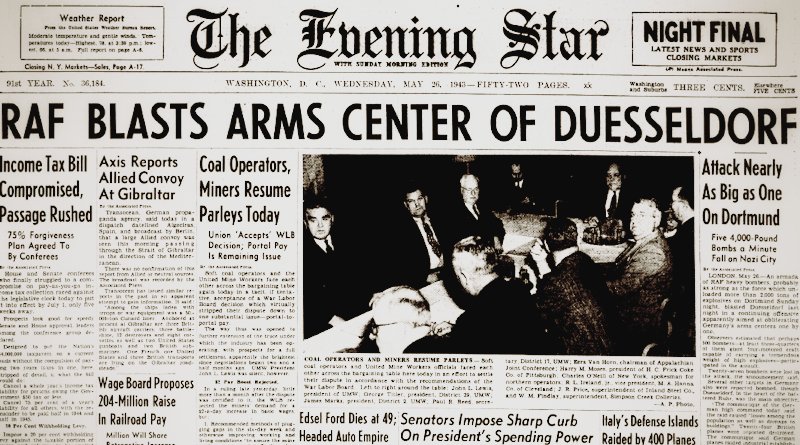World War II Chronicle: May 26, 1943
Click here for TODAY’S NEWSPAPER
An article on page three says the new Vought F4U Corsair is superior to the Japanese Zero in every respect. Earlier American warplanes were less maneuverable than the Zero, but were better armored and developed tactics like the Thach Weave that marginalized their opponent’s abilities… Page 29 reports that Adm. Isoroku Yamamoto will be buried on June 5 on the ninth anniversary of the burial of another Japanese naval hero, Admiral Togo — the “Nelson of the East.” Togo was raised as a samurai, defeated the Russian Navy in the Russo-Japanese War, was in charge of Crown Prince (now Emperor) Hirohito’s education, and believed he was Adm. Horatio Nelson reincarnated…
George Fielding Eliot column on page eight… Sports section begins on page 44.
Roving Reporter by Ernie Pyle
IN TUNISIA — (By Wireless) — The major portion of my time during the Tunisian campaign was spent with the First Infantry division and the First Armored division. That was because they were the earliest ones on the scene and I was best acquainted with them.
But there were other divisions too, in Tunisia, and in the final phase all contributed their part to the cracking of the Hun. If the war had lasted longer I would have swung over and written about these other units, too, but since that chance didn’t come, those of you at home who have men in these division may know that what I’ve written about one is largely representative of all.
The First Armored division was the one that made the kill and got the mass of prisoners. Yet their fighting was no better and no greater than that of the First Infantry division, which lost so heavily cleaning out the mountains, or of the Thirty-fourth division, which took the key Hill 609 and made the victory possible, or of the Ninth division, which swept the Heinies out of the rough coastal country in the north, or of the artillery that softened up the enemy, or of the fighting Engineers who kept streams bridged and highways passable. Or of any other of the countless units that contributed to the whole, and without a single one of which all the others would have been lost.
In this final phase of the Tunisian campaign we have yet to hear a word of criticism of our men. They fought like veterans. They were well handled. We had enough of what we needed. Everything meshed perfectly, and the end was inevitable. So you at home need never be ashamed of our American fighters. Even though they didn’t do too well in the beginning, there was never at any time any question about the Americans’ bravery.
It is a matter of being hardened and practiced by going through the flames. Tunisia has been a good warm-up field for our armies. We will take an increasingly big part in the battles ahead.
The greatest disservice you folks at home can do our men over here is to believe we are at last over the hump. For actually — and over here we all know it — the worst is yet to come.
Our front-line troops by now are getting pretty well saturated with little personal things they got from the Germans. Nearly everybody has a souvenir of some kind, running all the way from machine guns to writing paper.
A good many soldiers have made new pistol grips for themselves out of the windshields of shot-down German planes. The main advantage of this switch from the regulation handle is that the composition is transparent, you can put your girl’s picture under the grip and it will show through.
Sgt. Gibson Fryer, of Troy, Ala., has a picture of his wife on each side of the handle of his .45. Sergeant Frayer has noticed that the Germans are very neat in way. They have little toilet kits in their pockets. Among his souvenirs is a pare of manicure scissors he got from a prisoner long before the big surrender came.
Sergeant Fryer had an experience on one of the last few days of the campaign that will be worth telling his grandchildren about. He was in a fox-hole on a steep hillside. An 88-mm. shell landed three feet away and blew him out of his hole. He rolled, out of control, 50 yards down the rocky hillside. He didn’t seem to be wounded, but all his breath was gone. He couldn’t move. He couldn’t make a sound. His chest hurt. His legs wouldn’t work.
A medic came past and poked him. Sergeant Fryer couldn’t say anything, so the medic went on. Pretty soon two of Fryer’s best friends walked past and he heard one of them say, “There’s Sergeant Fryer, I guess he’s dead.” And they went right on, too.
It was more than an hour before Fryer could move, but within a few hours he was perfectly normal again. He laughs and says that if his wife sees this in print she’ll think for sure he’s a hero.
Ernie Pyle isn’t the only person to misspell Fryer’s name: He landed with the 16th Infantry Regiment at Normandy and earned the Distinguished Service Cross. Listed as a private, his citation refers to him both as Fryer and Pryor. Wounded five times, he also received the Silver Star and Bronze Star Medals.
Evening star. (Washington, D.C.), 26 May 1943. Chronicling America: Historic American Newspapers. Lib. of Congress.
https://chroniclingamerica.loc.gov/lccn/sn83045462/1943-05-26/ed-1/
